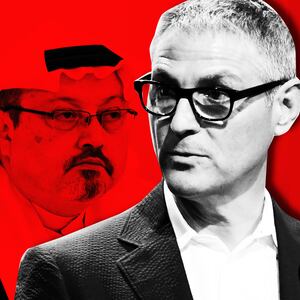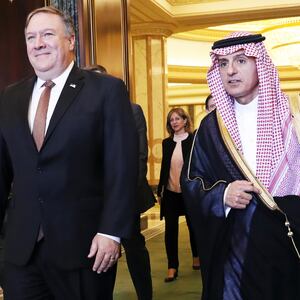Welcome to Rabbit Hole, a breaking news analysis that helps you get smart on the one story everyone’s obsessing over—for Beast Inside members only.
Why is Donald Trump so eager to buy Saudi Crown Prince Mohammed Bin Salman’s cover story about a “rogue operation” to murder Jamal Khashoggi, The Washington Post columnist and dissident critic? Well, it could be, as Trump said, that he’d rather prioritize the $110 billion in hoped-for arms deals with the kingdom than stick up for human rights. Another reason could be the fact that Trump, despite his tweet, has a lot of personal business deals with wealthy Saudis.
Trump and Uncle Adnan: Ironically enough, one of the Saudis who Trump did business with back in the 1980s was Adnan Khashoggi, the uncle of Jamal. Adnan was a high-profile financier who dabbled in arms dealing and got tangled up in the Iran-Contra scandal. When his finances took a hit, Khashoggi held a fire sale and pawned off his prized yacht, the Nabila, to Trump for somewhere between $25-30 million. “Not many people live a life like Khashoggi but I’m coming damn close,” Trump told Newsweek in 1987.
ADVERTISEMENT
The ship had previously made an appearance in the off-brand 1983 James Bond film Never Say Never Again. It also inspired its own Queen song, “Khashoggi’s Ship” (“Everybody drank my wine, you get my drift, and then we took a holiday on Khashoggi’s ship”).
The LLC trail: Trump’s financial-disclosure forms reveal hints of possible Saudi investments. His 2016 paperwork lists a number of companies named after the Red Sea city of Jeddah, a Saudi commercial hub that the kingdom has been promoting as a possible tourism hotspot. Trump was listed as either a member, president, or director of DT Jeddah Technical Services Advisor, DT Technical Services Advisor Member Corp, DT Jeddah Technical Services Manager, THC Jeddah Hotel Advisor, THC Jeddah Hotel Advisor Member Corp, THC Jeddah Hotel Manager, and THC Jeddah Hotel Manager Member Corp. In addition to his apparent Saudi businesses, Trump also invested broadly throughout the Gulf in hotel projects in Saudi Arabia’s closest ally, the United Arab Emirates, and in Qatar, currently one of its most bitter adversaries. The companies were still on his books at least throughout 2017 when Trump released his most recent financial-disclosure form in May.
The quotes: Don’t believe his financial statement? Listen to Trump himself. Here he is in South Carolina in July 2015 bragging about his Saudi clients: “Saudi Arabia—I like the Saudis. They’re very nice. I make a lot of money with them. They buy all sorts of my stuff. All kinds of toys from Trump.” A month later in Mobile, Alabama, Trump raised the issue of his Saudi millions again: “Saudi Arabia—I get along great with all of them. They buy apartments from me. They spend $40 million, $50 million. Am I supposed to dislike them? I like them very much.”
The Plaza: Just as Trump money helped fill the coffers of a temporarily embarrassed Saudi high-roller, an Arabian billionaire returned the favor to Trump in the early 1990s, when a recession hit the real-estate industry. Three years after Trump’s Plaza Hotel cameo in Home Alone 2, Saudi Prince Walid bin Talal helped bail Trump out of his flagging investment in the New York landmark by buying up Trump’s outstanding debts on the property. Talal, however, is hardly in favor at the court of Riyadh these days. He was one of many wealthy Saudis arrested by bin Salman, imprisoned at the Riyadh Ritz, and shaken down for millions on ostensible “corruption” charges.
Trump International: When staying in the U.S., Saudi diplomats make sure to rent a room at one D.C. hotel in particular: the Trump International. By The Washington Post’s count, Saudis visiting Washington on official business threw roughly $270,000 at the Trump Organization in the first eight months of the Trump administration.
A cover story emerges: Bin Salman looks like he’s about to take a page out of English King Henry II’s book and blame the assassination on overeager royal lackeys who took his lamentation, “Will no one rid me of this troublesome editor?” a little too seriously. CNN reported that the kingdom will—as Trump hinted—blame Khashoggi’s death on an “interrogation that went wrong” while carried out by Saudi operatives acting without permission. That flatly contradicts U.S. intelligence, shared with the Post, that indicates Mohammed Bin Salman personally approved an operation to abduct Khashoggi and bring him back to the kingdom.
Don’t fall for the Apple Watch nonsense: Turkish officials have been unusually candid and forthcoming with information on the alleged assassination. In particular, officials there have noted they’re confident that Khashoggi was murdered by the Saudis at their consulate because they possess video and audio recordings from inside. Bugs are the most obvious explanation for a government having recordings inside a foreign diplomatic space, but Turkish media close to the ruling AKP party have floated a somewhat ludicrous tale of Khashoggi somehow recording his own murder on his Apple Watch and uploading the footage to Apple’s iCloud. There are some good technical takedowns of the Apple Watch story, but the bigger picture is that the Turks are likely trying to launder the fact that they bugged a foreign diplomatic facility in their own country.
Horror show: Some of the more lurid accounts of Khashoggi’s death involve Saudi operatives armed with bone saws torturing and then dismembering the dissident journalist in an apparent attempt to smuggle his body out of the country. While little evidence suggests that Khashoggi is still alive, the sensational accounts of how he was murdered should be taken with a grain of salt. Part of the difficulty in getting to the bottom of how the Saudis killed Khashoggi is that most of the news is being leaked by another government led by a mercurial autocrat—Turkey. While U.S. intelligence leaks independently corroborate Saudi complicity in the disappearance and likely death of Khashoggi, the specifics warrant skepticism for the moment, particularly since Turkish President Recep Tayyip Erdogan has long been irritated by what he sees a Saudi crown prince overly accommodating of American interests.
The MBS MO: Step back for a second and look at the apparent Khashoggi assassination in the context of what we know about Mohammed Bin Salman. He leapt ahead of his cousin in the line of succession to have his father appoint him crown prince. He arrested a vast swath of the Saudi establishment on dubious corruption charges to consolidate power and intimidate potential opponents. He’s been a driving force behind the barbaric and counterproductive Saudi war in Yemen that has visited untold suffering on the country and killed thousands of Yemeni civilians. And he kidnapped Lebanon’s Prime Minister Saad Hariri and forced him to announce his resignation—since revoked—in a fit of pique over the direction of Lebanese politics.
The portrait emerging of the crown prince is of an adventurous, power-hungry ruler prone to lashing out with unconsidered gambits—someone who doesn’t appear to have anyone around him sensible enough or capable of telling him “no.” Given Saudi Arabia’s importance to American strategy and bin Salman’s personal closeness to the Trump White House, whatever comes of the Khashoggi disappearance, it seems unlikely it will be the last ill-thought-out caper to blow up in both his and Trump’s face.






